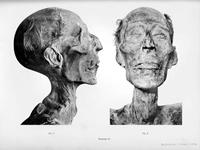The story of Gyges is a story in the Second Book chapter of Plato's Republic. Actually, Herodotus and Plutarch also wrote about Gyges, but Plato tells a rather interesting story about it.
In the episode where the story is told, Socrates and Glaucon have a discussion on truth. It is a debate about whether a person who has the opportunity to act as he pleases will choose right or wrong. Glaucon claims that a person with such power will definitely choose the wrong one and begins to tell the story of King Gyges.
According to the story, Gyges is one of the shepherds of the King of Lydia. One day, while Gyges was in the grassland, there was an earthquake and then a heavy rain, resulting in a large dent in the grassland. When Gyges looks inside the dent, he sees a giant bronze horse lying down and goes to examine the horse. Inside the bronze horse lies a huge dead man with a ring on his finger. Gyges takes the ring and puts it on his finger. After a while, when Gyges plays with the ring on his finger, he realizes that the ring has great power: it can be invisible when you turn it to one side, and it becomes visible again when you turn it to the other side.
Using the feature of the ring, Gyges succumbs to his curiosity and secretly infiltrates the palace of the Lydian King. Gyges, who sees the Queen in the palace, falls in love with her and in time manages to make the Queen fall in love with him. Gyges and the Queen kill the King of Lydia and Gyges takes the throne.
According to Glaucon, choosing the wrong is always easy and effortless for a person. Although accuracy may seem difficult, its benefits to people are not small. A person who chooses the truth gains honor in the society once. It also attracts the gods. Therefore, it is doubtful that the person who chooses righteousness does so for pure righteousness. Society is full of Gyges who will seduce his wife and kill the king when he gets the ring that gives him power.
Let's end the article with the following section, in which the book reminds us of a fact that has not changed for millennia:
“People are ready to publicly praise him when a bad person is rich and powerful and show him that he has a happy life. On the other hand, weak people who are not rich even though they are good are despised by others.”


 Nielawore
Nielawore









Yorum yazmak için lütfen giriş yapınız